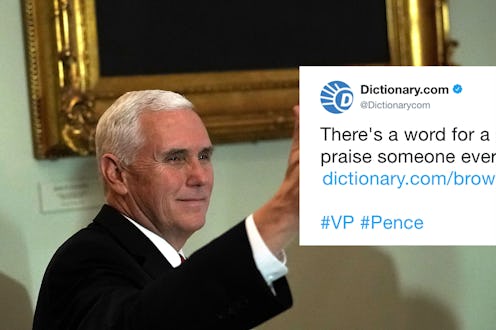News
Dictionary.com Trolled Mike Pence So Hard For Sucking Up To Trump

If there's any warning sign for a politician, it's when the dictionary starts dunking on you. That's a lesson that Vice President Mike Pence learned all too well on Thursday, less than 24 hours after a downright gushy meeting with President Trump following the passage of the Republican tax bill. After remarks in which Pence praised Trump once every 12 seconds, according to The Washington Post, an online dictionary decided to clue everyone in to exactly what they witnessed. Dictionary.com trolled Pence, with the word "sycophant" getting a shout-out on its Twitter account.
This is far from the first time Dictionary.com has gotten a little pointedly political on its social media accounts. Just last month, it selected "complicit" as its 2017 word of the year, which is about as clear a jab at the current administration as it gets. Earlier this year, after a Saturday Night Live sketch branded her as such, presidential adviser and first daughter Ivanka Trump told Gayle King of CBS News that she didn't know what the word "complicit" meant. Trump said that if complicit meant "wanting to be a force for good and to make a positive impact," then yes, she was complicit.
In this case, Pence isn't getting trolled for claiming her didn't know the meaning of the word sycophant — he's getting trolled for acting like one. Here's the tweet Dictionary.com sent out jabbing the vice president:
The site's definition of the word leaves little to the imagination:
1. a self-seeking, servile flatterer; fawning parasite.
Needless to say, none of those descriptions are particularly positive. Servile flatterer? Not so great. Fawning parasite? Ouch. Self-seeking? That might not be the worse quality if you're hoping to find yourself unexpectedly promoted to the presidency someday, but still, not a terribly flattering description.
Dictionary.com isn't the only online dictionary to let itself get a little more punchy and political this year. Merriam-Webster, for example, has also gotten into the act. Perhaps the most prominent early example was when White House counselor Kellyanne Conway claimed in January that then-press secretary Sean Spicer wasn't lying when he made demonstrably false claims about the size of Trump's inauguration crowd, but was merely presenting "alternative facts."
Merriam-Webster responded with a witheringly understated tweet, noting what the definition of "fact" actually is.
For the record, Merriam-Webster's definition of "sycophant" syncs tightly with the Dictionary.com definition: "a servile self-seeking flatterer." As to whether Pence has caught wind of what the dictionary is saying about him, well, that's not yet clear.
Pence is in Afghanistan on Friday, his first visit to a region where American forces are engaged in combat. And while he wasn't quite as forceful in his praising of Trump as he was when he was sitting across from the man on Wednesday, he did try to sell the troops on a positive message from the commander-in-chief. Namely, Pence claimed Trump instructed him to tell the assembled soldiers he loved them.
To each and every one of you, I bring greetings from your commander in chief. The 45th president of the United States of America, President Donald Trump. Now, before I left the Oval Office yesterday, I asked the president if he had a message for our troops here in Afghanistan. And he looked at me without hesitation from behind the resolute desk, and he said, "Tell them I love them."
Simply put, it seems like Pence is not shy about laying it on a little thick as far as his boss is concerned. Throughout the 2016 presidential campaign, when he would frequently and somewhat reverentially refer to Trump as a "good man," or "this good man," amid an ongoing slew of controversies and scandals which quite often suggested otherwise.